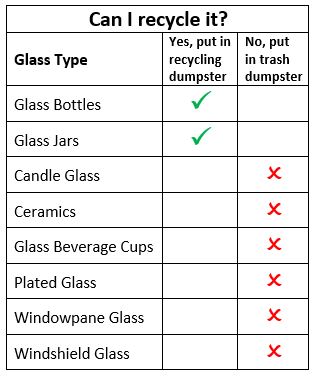
Glass Bottles and Jars
Glasd bottles and jars are the only glass items that can be traditionally recycled. Rinse them out before placing them in the recycling bin. Find a way to reuse other glass items, if possible. Otherwise, put them in the trash.

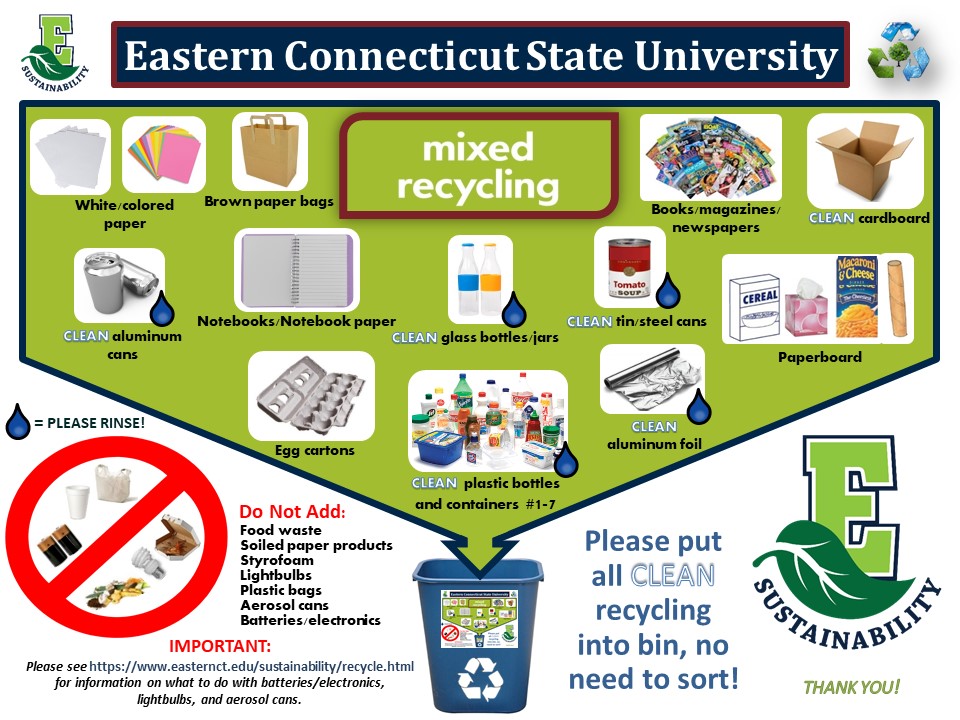
Eastern is fully dedicated in its on-campus recycling efforts. Be it faculty, staff, or students, everyone is doing their part. Eastern uses mixed recycling, meaning that you can place all acceptable recyclables together into any recycling bin. Recycling bins and dumpsters are provided throughout the campus. For more in-depth information, see Eastern's Environmental Health and Safety's Recycling Policy.

Glass Bottles and Jars
Glasd bottles and jars are the only glass items that can be traditionally recycled. Rinse them out before placing them in the recycling bin. Find a way to reuse other glass items, if possible. Otherwise, put them in the trash.
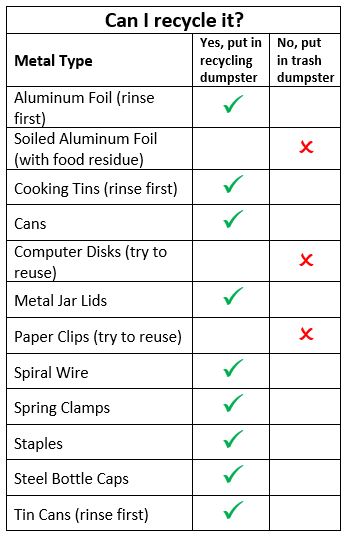
Aerosol Cans
Once an aerosol can is no longer being used, but is not thoroughly empty, faculty and staff should deliver it to Environmental Health and Safety at Eastern Hall, rooms 30 and 26.
As for students:
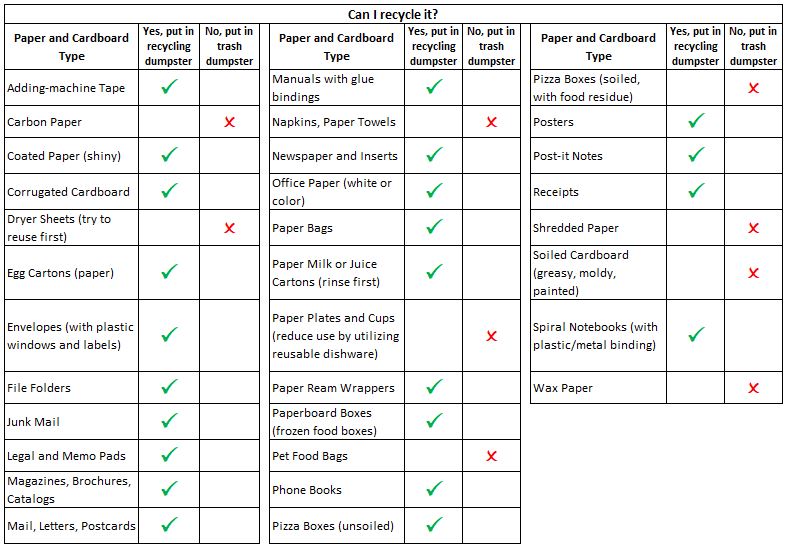
Books and Textbooks
Though this item is recyclable, it is preferred that books in usable condition are reused rather than recycled. Offer books to your local library, senior center, school libraries, friends, thrift stores, swap shops, and charities (Goodwill Industries, Salvation Army). Another program, Big Hearted Books, donates most of their books and recycle what can't be redistributed.
Textbooks can become outdated, but websites like Green Textbooks and Textbook Recycle both specialize in reusing and/or recycling textbooks. Other resources for book recycling include: International Book Project, Books for Africa, Books First, Bridge to Asia, and Better World Books.
Shredded Paper
Shredded paper is not recyclable, and must be disposed of in the trash.
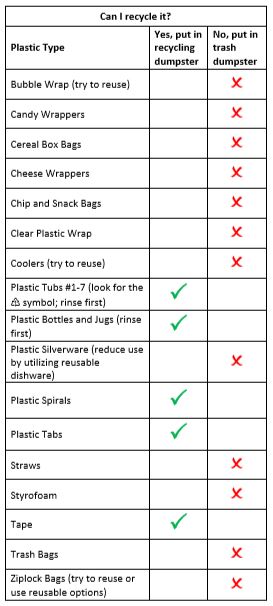
Plastic Grocery Store Bags
This item is not recyclable in the regular recycling bins. If possible, find a way to reuse this item. For example, grocery bags can be used as trash bags for small garbage cans. Most grocery stores have collection bins to reuse plastic grocery bags.
Many batteries are considered hazardous and cannot be discarded in the normal trash. These batteries must either have their ends taped with electrical tape or each battery must be placed in an individual plastic bag. Use the following procedures to assure they are disposed of properly:
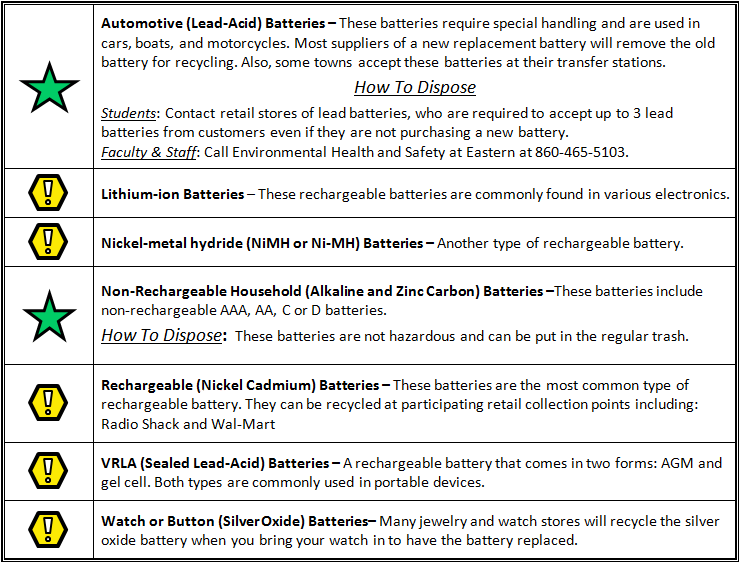
Items that are in good, working condition should be donated to local charities, such as Goodwill Industries or Salvation Army. They could also be posted to websites like Freecycle or Craigslist.
After electronics are no longer usable they are considered hazardous waste and must be dealt with accordingly:
This category includes Compact Fluorescent Lamp (CFL) bulbs. Fluorescent bulbs contain varying amounts of the toxic metal mercury and should not be disposed of in the regular trash. To dispose:
Students: Commuters can bring these to a Household Hazardous Waste Collection event. Residents should contact their Hall Director for further information.
Faculty & Staff: Deliver these to Environmental Health and Safety at Eastern Hall, rooms 30 and 26.
These cannot be placed in the regular recycling. Instead, various retailers like Home Depot and Whole Foods Market have seasonal trade-in or recycling services for both incandescent and LED string lights. You can also mail broken or obsolete lights to programs like Christmas Light Source, Five Star Holiday Décor, or HolidayLEDs.com. Otherwise, dispose of these in the trash.
Incandescent Bulbs
These are the traditional screw-in light bulbs. They can be disposed of in the regular trash. If you use these bulbs, consider switching over to fluorescent or LED bulbs, which provide a dramatic energy savings and minimize air pollution emissions from electrical generation plants.
LED Bulbs
These bulbs can be recycled at multiple retailers, including Ace Hardware, Batteries Plus, Aubuchon Hardware, IKEA, and Home Depot. Otherwise, LED bulbs go in the trash.
Cleaning Products
Unwanted or leftover hazardous cleaning products should not be disposed of in the trash. They cannot be flushed down the toilet, poured down sink drains, into storm drains, or on the ground. If you have hazardous products that you wish to dispose of, contact your Hall Director or bring them to a local Household Hazardous Waste Collection event.
There are environmentally friendly alternatives that are both as effective and safer than hazardous cleaning products. Some of these products are available for purchase at retail stores and have ingredients lists. You can also make your own cleaners, which are effective, cheaper, and less of a hazard.
Toner/Ink Cartridges
Most toner and ink cartridges can be refilled and reused at least 6 times. Retail stores (Best Buy, Target, Staples, Office Depot, and Office Max) will refill your cartridge or provide payment or credits when you recycle your cartridges. Other companies, such as Hewlett Packard, Epson, and Xerox, have services to recycle their own cartridges.
Water Filters for Drinking Water Pitchers or Faucets
Some companies have been starting up recycling of their filters to keep them out of landfills. Brita®, for example, is partnered with a recycling program called Preserve®, in which you can mail in or drop off filters or used products. Check the website of your water filter brand to learn how to recycle their products.
The creation of new products requires energy and materials which use natural resources and pollute the air. According to the EPA (Environmental Protection Agency), reducing and reusing the waste you produce is the most effective way to:
The CT Department of Energy & Environmental Protection (DEEP) has great resources on reuse and reduction as well as recycling.
Donating your unwanted items reduces waste, helps others, and can sometimes gain you tax benefits. To give locally, Windham Area Interface Ministry (WAIM) accepts donations Tuesday through Saturday. You can also donate to local churches, schools, community centers, nonprofit organizations, and thrift stores.